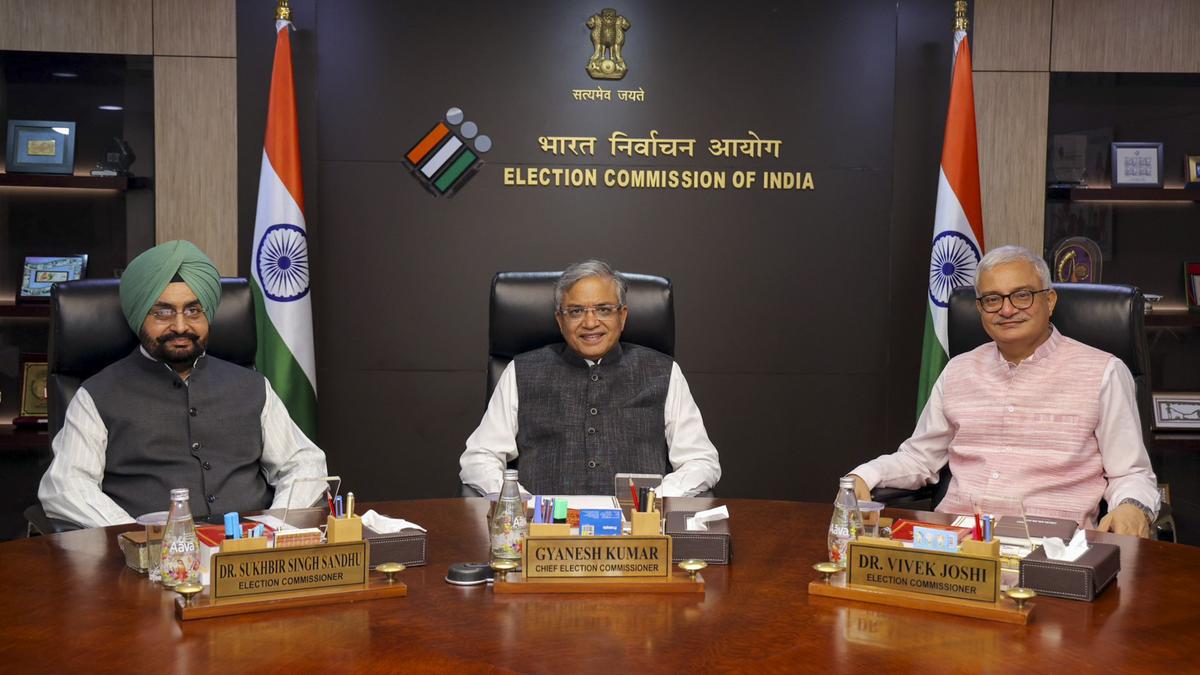Chief Election Commissioner Gyanesh Kumar is flanked by Election Commissioners Sukhbir Singh Sandhu (left) and Vivek Joshi. Photo: X@ECISVEEP via PTI
The Election Commission of India (ECI) ordered a Special Intensive Revision (SIR) of the electoral rolls in Bihar, which will be facing Assembly elections in November. Political parties in the Opposition have alleged that the SIR is aimed at disenfranchising thousands of voters in Bihar by disqualifying them on the ground that they are not citizens of India. The ECI has denied this allegation and justified the revision. In the meantime, many petitions have been filed in the Supreme Court challenging the ECI’s order. While the controversy centres on the motive behind this exercise being conducted just a couple of months before elections, especially when electoral rolls were revised in 2024, this article focuses on the legality of this exercise and the powers of the ECI to undertake it.
Reasons for disqualification
Article 326 of the Constitution declares that elections to the Lok Sabha and the Assemblies shall be held on the basis of adult suffrage. This means every adult person is entitled to be a voter provided they are not disqualified on certain specified grounds. There are two essential qualifications of being an elector under this Article: the person should be citizen of India and should be aged not less than 18. The Representation of the People Act (RPA), 1950, lays down disqualifications for registration as an elector. These are namely unsoundness of mind as declared by a competent court, and disqualification from voting as provided in Section 11A of the 1951 RPA. Conditions for registration as a voter are laid down in Section 19 of the RPA: the person should not be less than 18 years of age and they should be ordinarily resident in a constituency. The term ‘ordinarily resident’ is explained in Section 20, which says a person shall not be deemed to be ordinarily resident merely because they own or possess a dwelling house in that constituency. Also, a person does not cease to be ordinarily resident if they absent themselves temporarily from their ordinary place of residence.
The ECI enjoys enormous powers in respect of the preparation of electoral rolls and the conduct of elections to Parliament, the State Legislatures, and to the offices of the President and Vice President. Article 324 of the Constitution, which empowers the ECI to undertake these tasks, is characterised by the Supreme Court as a “reservoir of power”. Since the conduct of free and fair elections is an essential feature of the basic structure of the Constitution, the ECI needs to be vested with all the necessary powers to complete its task.
Nevertheless, it is inconceivable that the Constitution should confer on any authority unfettered powers. The Supreme Court has made it clear that the ECI can exercise all powers in its discretion in areas which are not covered by any statute but shall act in accordance with the law wherever it exists. In Mohinder Singh Gill v. Chief Election Commissioner (1978), the Court stated the law as follows: “Firstly when Parliament or any State Legislature has made valid law relating to or in connection with elections, the Commission shall act in conformity with, not in violation of, such provisions but where such law is silent, Article 324 is a reservoir of power to act for the avowed purpose of pushing forward a free and fair election with expedition.”
The qualifying date
Let us look at the relevant provisions of the the RPA to get a perspective on the powers of the ECI in regard to revision of the electoral rolls. Section 21 of the 1950 RPA deals with the preparation and revision of electoral rolls. It speaks of four stages of revisions: (1) before elections to the Lok Sabha or Assembly; (2) before each by-election; (3) on the direction of the ECI in any year; and (4) a special revision for a constituency or part of a constituency with the ECI recording reasons for doing so. All revisions except (4) are done with reference to a qualifying date, which, under Section 14, is the first day of January. The only exception is (4): no qualifying date is mentioned because it can be done any time.
The ECI order of June 24 mentions the qualifying date as 01/07/2025 and is a direction under Section 21(2)(b) of the RPA. It can be assumed that the revision being done in Bihar is under the same Section. But under this provision, the qualifying date should be 01/01/2025. The revision then should have been done from January 1, 2025. The qualifying date mentioned in the ECI order has no sanction under the law. Similarly, the term ‘special intensive revision’ is not found in the law. The only case where a special revision can be ordered by the ECI at any time is in relation to a constituency or a part of it and not in relation to an entire State.
Thus, it is reasonable to conclude that the SIR in Bihar is not in conformity with the provisions of the RPA. The ECI has claimed in its order that it has power under Section 21 to undertake the exercise. True, but that power is limited to a constituency or part of it under Section 21(3) of the Act.
While enjoying enormous powers under Article 324, the ECI is responsible to the rule of law and should be amenable to the norms of natural justice as per the Supreme Court. Electoral registration officers cannot summarily reject applications on the ground that foolproof documents are not being furnished to prove citizenship. Rule 8 of the Registration of Electors Rules clearly state that information shall be furnished “to the best of ability” of the citizens. The ECI cannot ignore this statutory stipulation.
Published – July 09, 2025 01:32 am IST

